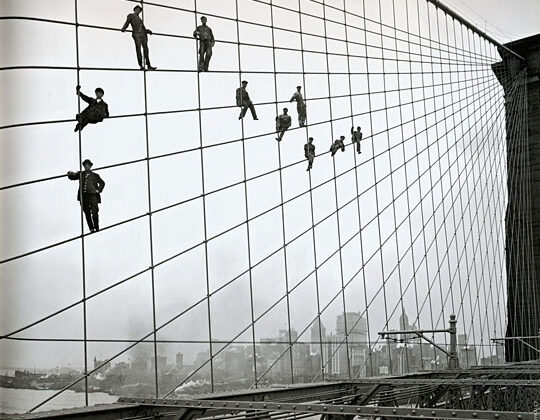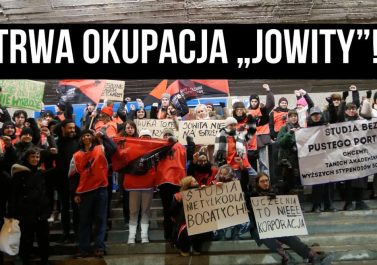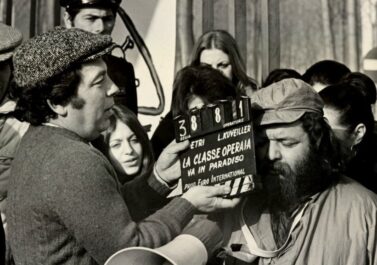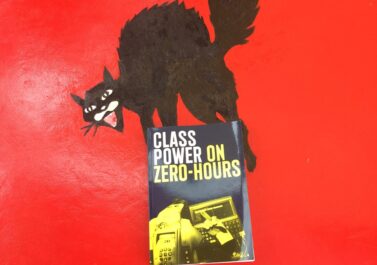We re-circulate this text for debate on our September 2014 meeting in Liverpool. If you have comments or are interested in participating, drop us a line: angryworkersworld@gmail.com
a) Intro
The proposal for a workers’ organisation is based on political assumptions – one of them being that the classical distinction in ‘trade union struggle’ and ‘party struggle’, in ‘economical’ and ‘political’ struggle, which is still prevalent amongst us, has become a stumbling block. This ‘party/union’-perspective allows ‘tactical’ participation in ‘institutional’ trade union work despite the obvious problematic results for the development of collective workers’ power. The clear shortcomings of ‘institutional’ trade union work can be justified as a problem of the ‘first stage of workers’ struggles’, which will be solved by the party politics waiting in the second stage.
The ‘union/party’-perspective also allows us to abstain from deeper analysis in material conditions and internal tendencies of workers’ struggles which would be necessary in order to explain current limitations. Instead, limitations are ‘explained’ by declaring the struggles as ‘economist’ and lacking ‘political consciousness and leadership’. These are tautological explanations which are meant to give final credit to one’s own ‘external role and position towards workers’ struggle. They are of as little use for the development of workers’ collective power as the general appeals towards workers’ unity. Workers’ unity is not the question of ‘umbrella organisations’, but arises only out of the struggle within the contradictive nature of capitalist production process, which at the same time combines and segments workers. Workers’ have to find forms of organisations which materially undermines the segmentation imposed by the production process – they cannot just step out and ‘generalise externally’.
The following theses won’t say anything new, they are meant to summarise a general position as a background for the debate on current struggles and future tasks.
b) Class Composition and Class Movement
The form of social production determines the form of social struggle and the vision of a ‘social alternative’. Although this is generally accepted, most political proposals of ‘how to organise’ and most ‘communist programs’ remain rather unhistoric or attached to the last century. Capitalist social production changes rapidly, the regional centres, dominating industrial sectores and ‘workers figures’ are transformed with each cycle. Within this process ‘the working class’ changes, we have to talk about specific ‘class compositions during specific cycles. The ‘technical class composition’, as the historically dominating form of the social production process, contains the process and potential of ‘political class composition’ – the form of class movement. [1]
By ‘technical composition’ we mean the actual historical form of how workers cooperate within a process of division of labour mediated by machinery and shaped by different levels of development; how the immediate production process relates to the wider social process of (re-)production and forms and levels of consumption; how formal individual skills relate to wider social skills of workers necessary to perform labour; how different categories and sections of workers are brought together and are segmented; how the class conflict is mediated institutionally and culturally.
By ‘political composition’ we mean the process of how ‘working class’ and ‘workers unity’ actually forms out of material conditions and experiences of struggles: the concrete form of organisation of struggle workers develop based on the collective nature of the capitalist production process, overcoming it’s segmenting nature; the concrete demands and wider social critique which springs up from concrete conditions and ‘aspirations of productivity’ – a historically specific relation between living and dead labour; the form of how particular struggles relate to each other and turn into a generalised movement due to the social dimension of production and general conditions within a capitalist cycle; how this generalisation tends to happen through struggles within central industries which can express an advanced stage of conflict between capital and workers; based on this relation between central sectors and wider society, specific forms of ‘economical and political’ organisations (councils, assemblies) of the class movement are formed and can express a specific ‘social alternative’, a historically specific communism.
c) Class Composition and Periodisation
Although historical periodisation contains a certain danger of becoming schematic we can state that, e.g. the cycle of transformation from agricultural labour and small peasantry to urban and industrial work corresponded to formation of ‘communist parties’ as bridge organisations [2], the early stage of skilled industrial manufacturing work gave birth to ‘councilist’ and ‘revolutionary syndicalist’ workers’ organisations, and the period of large-scale ‘Fordist’ industries, which were more integrated into general society brought forth organisational forms of ‘mass workers’, such as general assemblies and wider political coordinations with a quite different ‘communist vision’ from earlier perspectives of ‘self-management’. [3]
In this sense the ‘revolutionary potentials’ of struggles and movements are inscribed within the actual social production process. Communist activities have to relate to the ‘gaps’ between these given material social potentials and the concrete ongoing struggles – last, but not least by referring to the experiences in other regions or of the near past. The challenge obviously lies in the fact that the ‘technical composition’ is in constant change and that a dynamic relation exists between technical and political composition. The overwhelming rapidness and spacial vastness of these changes partly explains the leftist retreat into ‘fixed organisational models’, from ‘parties’ to ‘syndicalism’. What we then have to propose to the living working class today is dead weight of past times.
d) Class Composition and Capitalist Development
The forms of collective power which workers develop based on their combination within the production process is constantly undermined by capital’s attempt to ‘de-compose’: outsourcing, dismantling, introduction of new technologies and production methods requiring new skills, re-location to other regions of the globe, introduction of new categories of workers with different backgrounds etc.. The dynamic character of capitalism and ‘development’ in general is less explained out of ‘market-forces’ or ‘abstract greed for super-profits’, but by this dynamic relation-ship between struggle and changes in production as response. Capitalism contains class conflict through developmental leaps. This entails that the ‘de-composition’ (the segmentation of the working class in the production process) is done in a way which re-composes them on a higher level of social productivity. Capitalism is not merely ‘isolating’ workers in response to their ‘united efforts’ – it is isolating them through specific form of socialisation.
e) Economical – Political Contradiction of Productive Cooperation
Capital is forced to accumulate, less due to ‘internal competition’, but in order to be able to respond to workers’ struggle with an raise of workers’ consumption levels while at the same time increase in their exploitation. In order to ‘de-compose’ workers strong-holds and to re-combine social labour on a higher level, the general costs for machinery increase. The increased use of machinery and its increased share in total production costs is an expression of how capital intends to contain class struggle. Here we find the ‘economical’ and ‘political’ contradiction combined in the production process, in front of workers’ eyes and contained in their experiences: from an ‘economical’ point of view a smooth and close cooperation between workers is necessary in order to increase social productivity. Under given social class relations the ‘productive closeness’ of the social producer contains a ‘political danger’. Despite the fact that it hampers social productivity, which any worker is well aware of, capital has to segment the production process ‘politically’, be it through immediate division of labour, division between intellectual and manual labour, between sectors, between regions, different spheres of production and reproduction, between developed and underdeveloped regions, private and state sector and between nations. This is the sphere of communist theory, understanding and revealing the ‘political systemic forms’ based on workers’ direct experiences.
The ‘political segmentation’ of the social production process is not merely a question of control and domination of the working class. It is also a political requirement for capital in order to obtain its major social legitimation and ‘fetish’: to be seen as pre-condition of social production. Capital brings together individual workers within an industrial production process which cannot be put into motion unless labour is combined. Combination happens ‘under capital’, the resulting social productivity seems the productivity of capital. The fact that millions of new connections of global production are established ‘through capital’ is the major social backbone of exploitation and class system. What seems like cunning tactics of divide-and-rule creates thousands of little hick-ups in the production process, thousands of problems and mis-coordinations. That things run smoothly despite all the imposed barriers largely depends on workers (improvisation, creativity, overcoming problems) – who individually might perceive these problems as problems of ‘mis-management’. Here again workers’ organisations have to reveal the systemic nature.
This ‘capital fetish’ (capital as precondition of production) can only be undermined through revealing the social and political dimension of production process – by interrupting it in struggle. In order to obtain even the most minimal ‘victories’ and economic gains workers are increasingly forced to push beyond their immediate company level. If the daily grind of global supply chains start to stumble, because workers in one link interrupt the flow of production, this gives us a moment to create direct relationships. Communist activities have to refer to the ‘practical existence’ of the ‘collective worker’ – the totality of social cooperation necessary in order to produce, the antagonistic living force within capitalist relation of production. The ‘collective worker’ is necessary reference point in order to gain in power in any struggle for immediate demands and material basis for general radical social transformation on a world-scale. In this sense the ‘collective worker’ is a more historical, material and dynamic concept to analyse the process between particular struggles and political potential of change than the notion of ‘class in and for itself’, which leaves a gap in the transformation, generally filled with vague terms of consciousness.
f) Generalisation and Capitalist Cycle: Boom and Crisis
There has been little historical debate about the relation between class struggle, change of production system and wider capitalist cycle in terms of ‘boom and crisis’. [4] Debates have evolved separately about product or technological cycles, about cycles of ‘expansion’ and financialisation. The question of whether workers face boom or crisis, partly expressed through the conditions on the labour market, obviously impacts on the question of how they can struggle, of how their struggles can generalise and pose the question of a social alternative. Systemic questions mainly arise at times when the working class still contains the structural power and aspirations of a period of ‘expansion’, which also opened space for widespread critique of the ‘alienating and despotic form of expansion’, but faces a crisis which eradicates the hope for ‘a better future’, despite the still blatant potentials of social productivity. The period between 1968 and 1977 is an example, we most likely face a similar situation on a more global scale today.
With the current global crisis it becomes more and more difficult for capital to portray itself as a pre-condition and coordinator of production: capitalist social productive cooperation has to pass through the fragile channels of companies, markets, money. Under condition of crisis the cooperation rips, small links in the chain go bust, millions thrown into unemployment, millions are made to work till total exhaustion. ‘Managers’ supposed to be responsible to ‘coordinate’ the cooperation of billions, but they are increasingly trapped within their ‘small links in the chain’, be it sectorial or regional. Their only answer to the crisis – bail out followed by austerity – aggravates the conditions.
The managers of capital try to enforce austerity against the overt potential for abundance. They can only succeed as long as they are able to separate the social experience of over-productive labour from the poverty of un-/underemployment. Obviously this separation does not take a pure form of ‘employed working-class’ on one side, ‘impoverished proletariat’ on the other. This separation appears in its various shades of development and underdevelopment, of high-tech and labour intensity, of regional deprivation and boom centres, of respectable workmen and lumpen, of hire and fire. This separation will appear in all imaginable ethnic colours. With the disappearance of the old buffer-classes, with the social death of peasantry and artisans in the global South, the demise of the self-employed educated middle-classes and petty bourgeoisie, capital has to face up to it’s living self. While being in it’s essence the violent coordinator of social labour – ‘globalisation’, international supply-chains etc. – in this crisis more than ever capital has to hide and segment the global character of social cooperation from the emerging global working class. In the attempt to segment and re-combinate capital becomes a burden to social cooperation. It gets in its own way. Therefore the challenge for working-class communists is to point-out the ‘political separation’ of development (social productivity) and underdevelopment (poverty), the potential of abundance in the face of stark misery. In order to do this we will have to re-consider old concepts used to describe the relation between centre and periphery, e.g. the concept of ‘imperialism’, ‘Third World’ etc., which seem to blunt in order to analyse the emerging global class composition.
g) Union Question
On the background of the process of ‘class de-composition and re-composition’ we can easily see that the problem with trade union struggle is not merely its ‘burocratic undemocratic forms’ or limited ‘economic demands’. The formal and legal framework of trade union organisation does not allow workers to organise on the same level and scope as capital is trying to both combine and disorganise them. While modern companies combine workers beyond categories, company, sector and national boundaries, trade unions can neither reflect this scope nor the rapidness of changes. In addition they have to stick to legally prescribed forms of struggle which by definition will keep workers subjugated to the playing field of state and capital. Amongst communist there will not be much disagreement about these facts.
The disagreement rather concerns the question of the relation between ‘economical’ and ‘political’ struggle, between ‘trade union struggle’ and ‘party or political organisation’. [5] Without going into detail we can state that the position which perceives the ‘economical’ and ‘political’ struggle of the working class as two separate stages – and therefore the ‘party’ as a kind of political complement to the trade unions – has its origins in a historically specific stage of development of capitalist class relations: an early one. The traditional Leninist conception is based on social conditions where industrial production and working class was still marginal, where the state was not majorly involved in industrial relations, where there existed still a major gap between ‘factory and wider social reproduction (schools, science), where the ‘immediate production process could be seen as a mainly ‘economic sphere’ with little connection to the rest of society and ‘politics’.
Since Lenin, with the development of a ‘planning state’ (state industries, direct intervention in industrial planning and relations etc.) as the extension of planning from factory into society, with the extension of ‘scientific’ industrial form of production into all spheres of social life and with the working class becoming a social majority, the question of what is ‘economical’ about the social production process and what is ‘political’ has obviously changed. With these changes also the institutional role of trade unions has transformed drastically. From a ‘school’ of workers in a seemingly gradual process towards ‘political consciousness’, they have been reduced to institutions which – confronted with the vast extension of the social production process – are legally and formally confined to a very narrow social sphere. Their main influence is based on the necessity of capital to control the wage-productivity development. Under these conditions, to maintain Lenin’s classical notion of a rather schematic distinction in economic and political struggle will have negative results.
h) From Workers’ Struggle to Social Transformation
The classical two-stage model of ‘trade union’ and ‘political party’ formation makes it impossible to discover the ‘revolutionary contradictions’ within the social productive cooperation. It is a disjointing, rather then elevating on a higher level of consciousness: limited to the trade union framework workers will not be able to generalise their struggles along the lines of their already existing productive relationships and the ‘political generalisation’ through the party is in most cases happening detached from social production in the ‘political sphere’ (campagnes, mobilisations etc.).
The generalisation within social production itself is the main precondition to materially undermine segmentations and the ‘capital fetish’ (capital as the organiser of society). It is ‘economic struggle’ through which workers have to discover the political nature of capitalist production – the class content of science, technology, institutions. This mass process of discovery cannot be by-passed, the ‘generalisation’ cannot be short-cut through the various channels bourgeois politics have to over: from trade unionism to parliamentarism, from identity politics to regionalism or nationalism.
The class movement will have to develop its organisation along the lines of global productive connections and materially change these connections: in its intensive stage class struggle will simultaneously have to create the (pre-)conditions for ‘the production of communism’. Workers’ struggles will not only ‘attack capital and the state’ by withdrawing social labour – strikes will interrupt social reproduction to an existential degree and thereby force the class movement to re-organise production and circulation while fighting. In this stage of class struggle we will be able to discover not only how social labour is globally integrated, but also that most social labour in capitalism is superfluous – no one will complain about the lack of market research calls or supply of electric tin-openers. A huge mass of human energy and creativity will be set free. At the same time the class movement will face the question of how to re-organise production in a form which not only guarantees effective subsistence, but also extends the ‘self-organisation of struggle’ into a self-organisation of social production: abolishment of hierarchical division of labour and uneven development. The revolution is not only an act of ‘smashing/taking power’, but of revolutionising social relationships, of getting rid of the contradiction between individual and social by materially transforming how we (re-)produce our social existence. In this sense is only logical that the ‘trade union/party’-perspective also disjoints ‘revolution’ from ‘production of communism’ and sees communism rather as a ‘policy’ which can be introduced.
The Leninist conception of ‘trade union’ and ‘party’-struggle was based on a less developed industrial/agricultural society. The practical expression of this notion revealed itself when the new (Bolchevique) state dismantled the Sowjets, the workers’ economical-political organisations, during the first years after the Russian Revolution. [6] The ‘New Economic Policies’ (Fordist industrialisation plus ‘market’ incentives) at the time required to impose ‘a strict centralised regime on factory and society’. We can argue about the ‘historic necessity’ of this policy, e.g. the historic necessity to appease the emerging middle-peasantry or maintain a standing army, fact is that in order to impose this regime the new state forced workers to give up their economical-political power in form of the sowjets. The new state strategically re-introduced a separation: workers were supposed to turn to ‘trade unions’ for their ‘economical needs’ and to ‘the party’ for political direction. In this way workers’ productive collective power was undermined and the driving force of revolution extinct. This was the degeneration.
i) Tasks and Continuity of Workers’ Organisations
On this background we maintain that their is a continuity between ‘economical-political’ organisations today – from the the most minute level of shop-floors and industrial areas – and these future ‘economical-political’ organisations of communist revolution. [7] In a modern capitalist society there can’t be a conceptual-organisational gap between the embryonic and developed forms. Workers’ organisations have to find practical collective answers within daily workers’ struggles in a way which always keeps open the possibility of expansion and generalisation – towards the ‘collective worker’. The coordinated collective steps have to be able to ‘give some relief’ to workers here and now by helping to gain concrete ‘victories’, while at the same time referring organisationally and conceptually to the necessity of social revolution. They have to use the minute scope of ‘anticipation’ (question of which forms of struggles or demands could help catalysing and generalising struggles in concrete time and space) based on the knowledge about current struggles and their position within wider social production. They have to use the current global scope of struggles to build international links which survive the ebb and flow of particular struggles and can come to a truely global perspective and organised practice. Workers’ organisations in that sense are not the ‘organisations through which the working class struggles’, they are rather organisations which support the tendencies towards self-organisation and emancipation in the struggles and movements as they happen.
Footnotes:
[1] For the historical debate about these concepts see:
http://libcom.org/library/renascence-operaismo-wildcat
http://libcom.org/library/storming-heaven-class-composition-struggle-italian-autonomist-marxism-steve-wright
[2] Loren Goldner argues this thesis in his text concerning the general relation between capitalist development and agrarian revolution:
http://libcom.org/library/communism-is-the-material-human-community-amadeo-bordiga-today
[3] Two essential texts on the question of changing class compositions and changing forms of ‘communist movement’:
http://libcom.org/library/class-composition-sergio-bologna
http://libcom.org/library/tribe-of-moles-sergio-bologna
[4] One of the few attempts has been undertaken in ‘Forces of Labor’, by Beverly Silver.
http://www.wildcat-www.de/dossiers/forcesoflabor/fol_preface.htm
http://www.wildcat-www.de/dossiers/forcesoflabor/fol_dossier.htm
[5] Essential text by Mouvement Communiste on the ‘union question’:
http://mouvement-communiste.com/documents/MC/Letters/LTMC0311EN.pdf
[6] On the relation between ‘Bolshevik’ state and workers’ sowjets:
http://en.internationalism.org/ir/1977/08/communist_left
http://libcom.org/files/The%20Russian%20revolution%20in%20retreat.pdf
http://libcom.org/library/bolsheviks-workers-control-solidarity-introduction
[7]
The experience of workers’ coordinations in Italy in the 1960s – 1970s illustrate the ‘economic-political’ character and the cohesion between direct struggle and revolutionary organisation:
http://libcom.org/history/porto-marghera-%E2%80%93-last-firebrands



